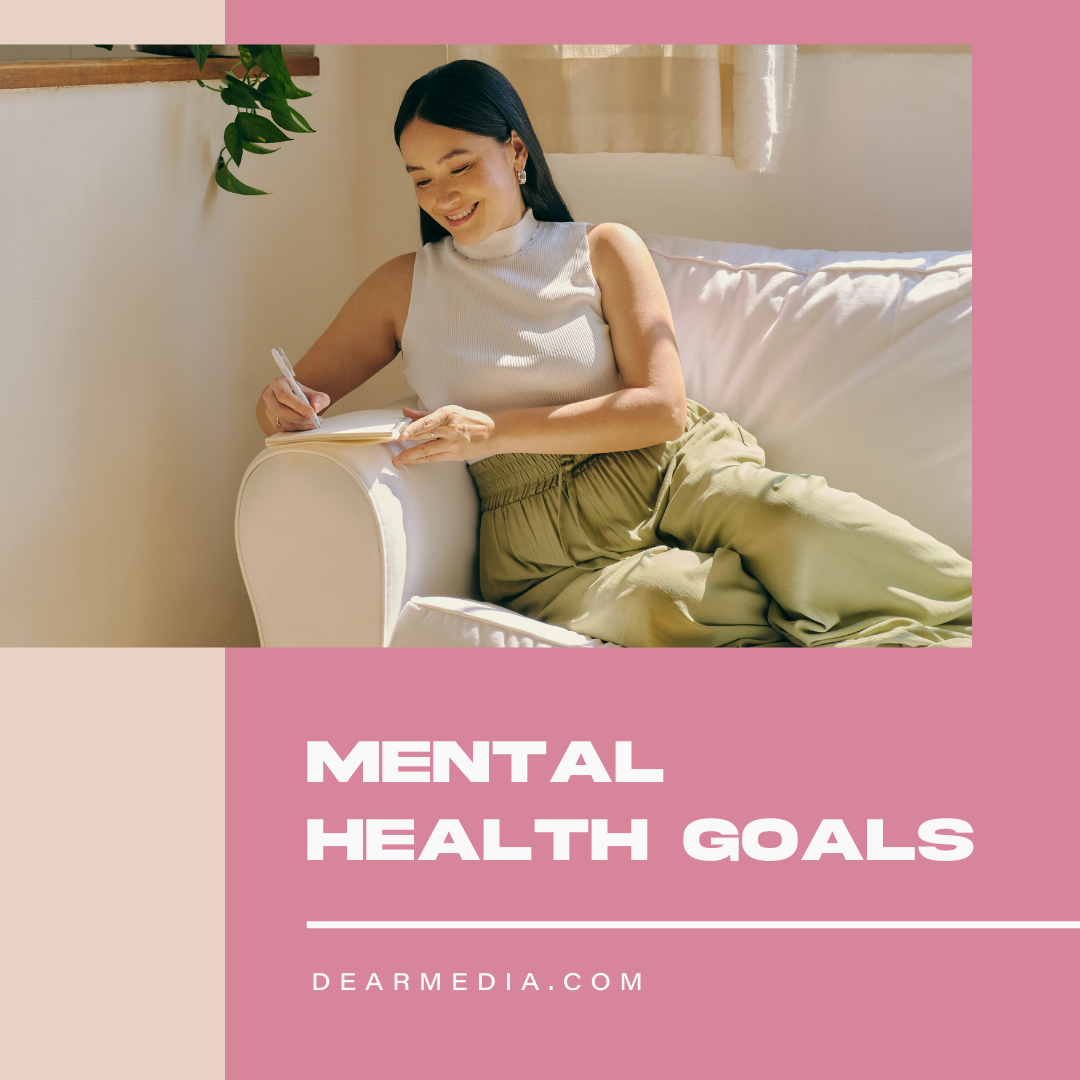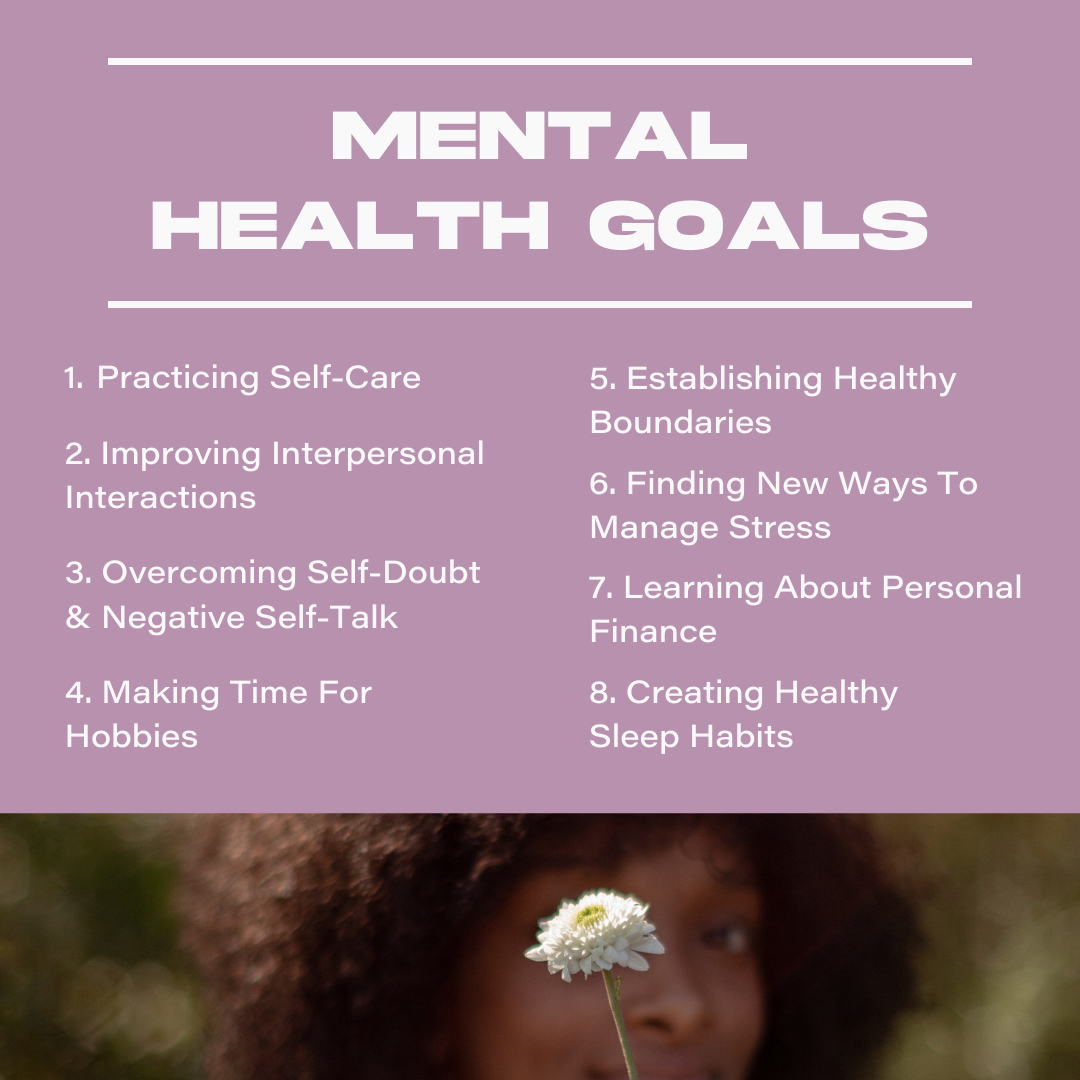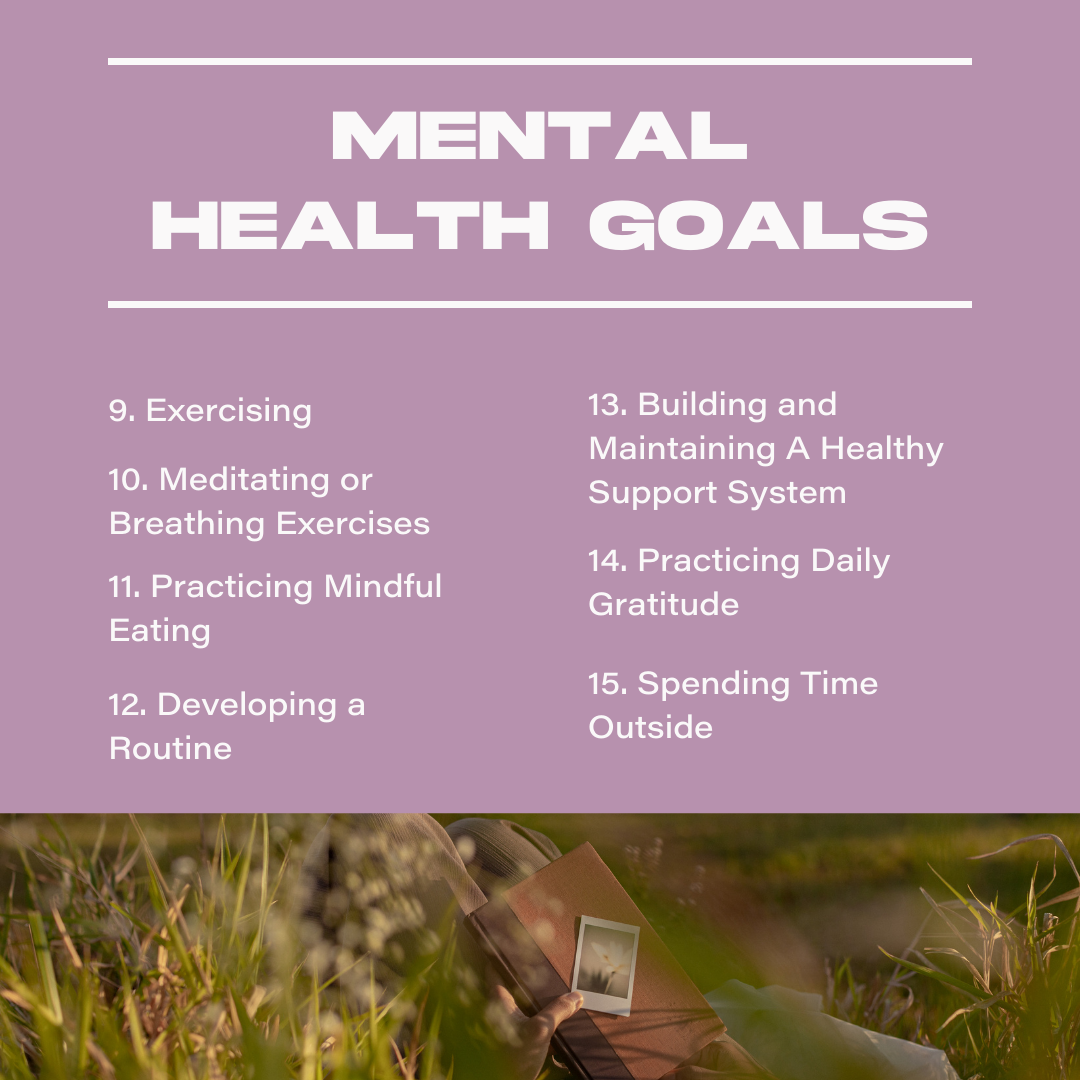15 Mental Health Goals
We put a lot of emphasis on taking care of our physical health, but babe, let’s not forget about our mental health! Your mental health status can have a significant impact on your overall thoughts, emotions, and reactions to different situations. Meaning, that improving mental health is essential to true wellness.
Setting mental health goals is a great way to prioritize yourself and boost your emotional growth. It’s all about living your authentic life and feeling damn good about it. So, if you’re in a funk, listen up!
Today, we’re sharing a round-up of specific, measurable mental health goals (and episodes from some of the best mental health podcasts) that can help you overcome anxiety, depression, and other mental wellness struggles. Here are the goals:

15 Mental Health Goals

Practicing Self-Care
Don’t allow yourself to think of self-care as selfish. Self-care is crucial to good mental health.
Try to incorporate small acts of self-care throughout your week to dramatically improve your mental well-being. It can be something as simple as soaking in the tub or something as time-consuming as a trip to the spa. Do what makes you feel relaxed and happy!
(Need to get hyped up for this one? Listen to the episode of Let’s Be Honest called Do What Makes You F*cking Happy!)
Improving Interpersonal Interactions
Sometimes, we’re the toxic ones. We lose our temper, assume the worst in people, and struggle with empathy. This makes maintaining friendships super hard!
This isn’t meant to shame you at all, because we’ve all got baggage and triggers that can diminish our interpersonal skills. However, if you focus on improving those, you can cultivate better relationships and foster a more positive environment!
You can improve your interpersonal interactions by learning to show interest in others, control your emotions, and demonstrate compassion. Learn more about this in the episode of What We Said called Are You Toxic or Am I? and the episode of ILYSM called The Ultimate Adult Friendship Episode.
Overcoming Self-Doubt & Negative Self-Talk
Creating a positive environment isn’t just how you talk to others, it’s how you talk to yourself! When was the last time you paid attention to how you spoke to yourself? How would a friend or family member feel if you spoke to them the same way?
How you talk to yourself is important. Constant negative thoughts and self-deprecation can significantly impact your mental health, and not in a good way. Try showing yourself some love and being kind to yourself. You might be surprised by how much of a difference it can make for your mental health. If you need some help with this, listen to Self Mastery + Coping with Negative Self-Talk from Looking Up and grab this Be Kind to Your Mind tote bag. It’s the perfect reminder!
Making Time For Hobbies
We get so busy with life we forget we used to like to do things. It’s all work, appointments, and commitments—but where’s the fund? As you create goals with your mental health in mind, think about how you can make more time for your hobbies.
If you’re not sure which hobbies to participate in, consider starting something totally new! Start reading with the gals at Readheads, get cooking with Shira at Good Instincts, or learn about wine with Helen at Wine Face! Or, do something else! The opportunities are literally limitless. (Here are even some hobbies that can make you money.)
Establishing Healthy Boundaries
Setting boundaries, both with personal relationships and work relationships, is important for good mental health. If you find that you’re someone who gives more than you take, it might be worth it to set some boundaries.
As uncomfortable as they can be to put in place, boundaries are important for healthy, functional relationships. You can learn more here on how to set boundaries with friends and family here! And, when you get those boundaries set, celebrate with The Bad Broadcast boundaries crewneck.
Finding New Ways To Manage Stress
Stress is pretty much unavoidable, but there are healthier ways to deal with it and minimize its impact on your mental health. Rather than relying on unhealthy tactics to cope with stress (like binge-watching The OC over and over), take advantage of healthier, more beneficial ways to deal with your stress.
For some people, that might mean exercising daily, while journaling might be more effective for others. Find what works for you, both in the short term and long term, to ease the stress in your life. You’ll find lots of coping techniques in this episode of Dear Gabby and this episode of Everything is the Best.
Learning About Personal Finance
Money problems can seriously cause SO much stress and anxiety. If you’re living paycheck-to-paycheck or are stressed about your financial growth, spend time learning about personal finance and improving your habits. As your financial wellness improves, so will your mental health!
Creating Healthy Sleep Habits
Don’t underestimate the importance of quality sleep. Research has proven that sleep and mental and physical health are closely connected. In fact, not getting enough sleep can increase your chance of developing a mental illness.
Practicing good “sleep hygiene” is an easy way to get better sleep. Sleep hygiene basically means setting yourself up for sleep success. Here are some examples:
- + Put your phone down for the last hour of the day
- + Avoid caffeine in the evening
- + Create a more relaxing sleep environment (sleep in a cool, dark room)
- + Go to sleep and wake up at the same time every day
Don’t stop at these great sleep tips, also listen to this episode of The Blonde Files and this episode of The Art of Being Well! They’re game-changing episodes!

Exercising
Something else you definitely don’t want to underestimate is the power of exercise to improve your mental health. Research has shown that regular exercise can help ease the symptoms of depression and anxiety.
To be considered “active,” all it takes is 15 to 20 minutes of light exercise, once or twice a day! If exercise isn’t currently a part of your weekly routine, start small and work on incorporating more exercise into your schedule. Your mental well-being will thank you!
Meditating Or Breathing Exercises
Meditation is a powerful remedy for anxiety and stress. When you add deep breathing to the practice, you’ll begin to notice almost immediate relief from your anxiety.
If you’re new to meditation and breathing exercises, listen to Mind. Body. No Soul. Jackie Schimmel is all about approachable self-care and makes medication super easy. Try to clear your thoughts and focus only on your breathing.
Practicing Mindful Eating
How often do you find yourself rushing through a meal or gobbling down a snack as quickly as you can? Actually making time to eat is hard, especially when you have so many other things on your to-do list.
Another practice to consider when focusing on your mental health is mindful eating. Mindful eating is a type of mindfulness that encourages you to eat slower, eliminate distractions, engage your senses, and pay more attention to your hunger and satiety cues. This way, you can feel good after you eat!
Developing A Routine
A daily or nightly routine can go a long way in improving your mental health. However, there’s no “one-size-fits-all” routine to follow. Your routine should be customized to suit your individual needs.
Consider your schedule, as well as what makes you feel good both emotionally and physically, and develop a routine you can follow. Don’t be afraid to experiment with different things until you figure out what works best for you.
Building And Maintaining A Healthy Support System
Surrounding yourself with friends and family who make you feel loved and supported is important for your emotional health. Even if you’re a homebody who prefers to spend most of your time alone, there are TONS of ways to build and maintain the relationships that are most important to you.
You can also create a reliable support system outside of your loved ones. Consider talking to a mental health professional. As you’ll learn in the series episodes of Good Morning, Monster, a professional can offer a unique perspective and make it easier for you to achieve your goals.
Practicing Daily Gratitude
Practicing gratitude is a great way to boost your mental health and overall well-being. Research has shown that people who practice gratitude tend to have better mental and physical health.
There are several ways to practice gratitude. One of the easiest ways is to keep a gratitude journal. A gratitude journal makes it easy to focus on the things that make you happier and improve your quality of life.
Spending Time Outside
Another easy way to promote better mental health and decrease anxiety and depression is to spend more time outside. Basking in the sun and breathing in fresh air, (with sunscreen, of course). can significantly improve your mindset.
Try incorporating a daily hot girl walk or enjoy reading a book outside to see how much it can improve your mental health.
Setting mental health goals is a great way to improve your emotional well-being.
If you struggle with anxiety and depression, you’re not alone. We hope that these tips will make it easier to achieve your mental health goals! You deserve a healthy mind! To learn more about how to improve your mental health and feel better overall, head over to the Dear Media blog. We got you!



















